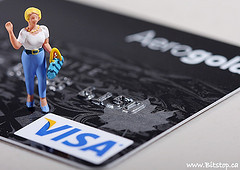Apparently, Any Transaction Can Be 'Foreign'
The Internet brings a global marketplace to us as we sit on the couch eating Pop-Tarts while wearing pajama pants. But a world of options brings a world of fees, thanks to our banks. Beth would expect her credit card issuer, Citibank, to assess foreign transaction fees if she were using her card abroad. Not if she were buying a domain name through Yahoo.
Dude. If I didn’t hate Citibank so much I’d have to give them credit for their escalating creativity in taking money out of my pocket. The latest: when I reviewed my credit card bill I noticed a foreign transaction fee of $11, which stood out because I haven’t left the country for about a year. When I called them, they said it was for two separate charges: a design contest I’d paid for on 99 Designs, and a domain I’d purchased from Yahoo, which outsources its domain managed to a firm in Australia. I made both purchases in US dollars, and on 99 Designs nothing even indicated that it’s foreign-based until I dug around on the website. “Are you suggesting that I should investigate every company I do business with to make sure their back office processing isn’t handled in another country?” I asked the Citibank lady. She said there was nothing she could do.
Her manager did eventually remove the fees– “as a courtesy,” which makes it sound like it was only because I was screaming and not because they think it’s fundamentally wrong to fleece customers.
I review my bill every month to look for fraud anyway… now apparently I need to look for fraud from Citibank, as well. Until I ditch them, that is.
In the case of 99 Designs, a quick glance at the site’s “About” page shows that the company was founded in Melbourne. But do we have to learn company histories every time we want to make a purchase in order to avoid surprise fees?
Want more consumer news? Visit our parent organization, Consumer Reports, for the latest on scams, recalls, and other consumer issues.


